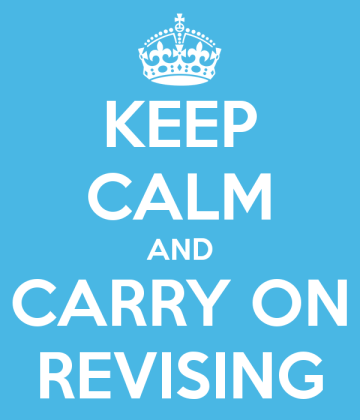This week at Year 11 parents’ evening I found myself giving the same advice to a series of conscientious, hard-working and keen students and their families. The advice went something like this:
There are two ways to mess up revision. One is not to do enough – then you will definitely underachieve. The second is to do too much. Then you will panic, get over-tired, and possibly make yourself ill. Then you may also underachieve. You need to find the “sweet spot” with revision where you are working just hard enough to achieve your best, but not so hard that you make yourself ill.
It struck me on the drive home that this piece of advice encapsulates a really important dynamic tension in what good schools should do for students. I want my school to be an environment which does everything it can to ensure that young people are happy, and successful. Or, alternatively, successful and happy. But which way round should it be?
#SLTchat The best pastoral care for my most socio-economically challenged students is 5A*-C EM. Period.
— John Tomsett (@johntomsett) May 12, 2013
I’ve worked in and visited many different schools. Some of them have prioritised pastoral care, building relationships, and providing positive experiences for young people, sometimes at the expense of academic results. Others of them have had a relentless focus on academic progress and achievement, and have consequently been rather joyless places for young people to attend. I am fortunate in that my current school has the balancing act right, but it’s like finding the biting point on the clutch when you first learn to drive – it requires constant monitoring, feedback and minute adjustments of pressure to get it right. Sometimes you have to ease off a bit, sometimes give it a bit more gas. And the only way you get better at this tricky balancing act is through deliberate, thoughtful practice – and experience.

Getting the balancing act right
This tension is demonstrated in classrooms every time that good learning is taking place. For learning to be effective, students have to be confronted with something they don’t know, or can’t do…yet. This is, naturally, an uncomfortable experience. Some students find it very difficult and will look for ways to avoid the discomfort of a demonstrable lack of understanding or ability. This may manifest itself in misbehaviour or attention seeking to distract from the perceived failure. It may also appear in work avoidance and apparent distraction as the student’s mind slides away from the uncomfortable experience into the warm embrace of inactivity.
The best teachers make their classrooms safe havens, where students do feel comfortable getting it wrong. Where it is okay to admit that you don’t know, where it is fine to have a go and fail, and where there is no shame in making mistakes. This is only possible where there is trust that it is a non-judgemental environment where all learners expect to be challenged beyond their current capability. Pitching the lesson in what Vygotsky called the zone of proximal development, just beyond what they can currently do, is one of the key elements of effective differentiation and is essential if effective learning is going to take place. But it needs more than accurate assessment of performance and carefully planned and pitched activities; it needs the culture to be right. And whilst a teacher alone can create a magical culture in their own classroom, that task is simplified a thousandfold if it is a manifestation of the culture of the school as a whole.
Laura McInerney has proposed this area – Productive Emotions – as the second of the Touchpaper Problems being explored through research: “How can one invoke in a class the emotional state most productive for: (a) prosocial behaviour, (b) evaluative thinking, (c) memorization, (d) creation?” The question was explored by a team led by Eleanor Bernades and Katharine Vincent at the recent Touchpaper Problems Party and I’m fascinated by it. The best teachers can invoke this emotional state, providing challenge and the security that allows learners to feel uncomfortable, safely. How do they do it?
From my observations, it seems that they have:
- An passion and enthusiasm for, and an excellent command of the subject matter
- Crystal clear expectations of both behaviour and attitude to learning
- The emotional intelligence to perform the minute recalibration of delivery required for the individuals, groups, moods, day, time, season and wind direction of the moment
- The confidence of the learners that the first three are consistently present day in, day out, in every lesson
Lessons have to provide the challenge of the climb and the security of the safety harness at the same time. Schools should do the same.
How do you think teachers in the classroom, and leaders on a whole school level, can best balance academic challenge with personal well being? Let me know your thoughts in the comments below.



I am trying to illustrate something of what you write about in terms of sen in my blog post here http://www.notsooordinarydiary.wordpress.com/mountaineering
At first glance it may seem to be simply a story about taking my son for a walk, but what I am really trying to express is that sense that many children with sen feel – that what we demand of them in the classroom is just too overwhelming to attempt. (And also point out that for some children, simply being at school is an achievement in itself)
In order to teach effectively, and give children that atmosphere in iut classrooms that you write of, then we need to know them well enough to understand at least some of the challenges they face, and provide for them a safe place where they can attempt new challenges, either in such a way that they understand that failure is part if the learning process and that you/I won’t punish/ridicule them for it, or by providing challenges that are subtle/small enough that they don’t really realise that they are ‘scaling heights’ until they get there.
I could very easily be accused of being a heart-on-my-sleeve teacher – but (and this is one thing my own children have not taught me) I think that unless we involve out emotions into the process (and I do understand that we need a certain amount of professional detachment) we will never succeed in providing that ‘optimal atmosphere for learning’. I wrote about that here too: http://www.notsoordinarydiary.wordpress.com/did/a/teacher/change/your/life
I’m still gutted to have missed the problem party!
PS I teach primary SEN.
Love the four points at the bottom of the post- nice summary.
Reblogged this on The Echo Chamber.